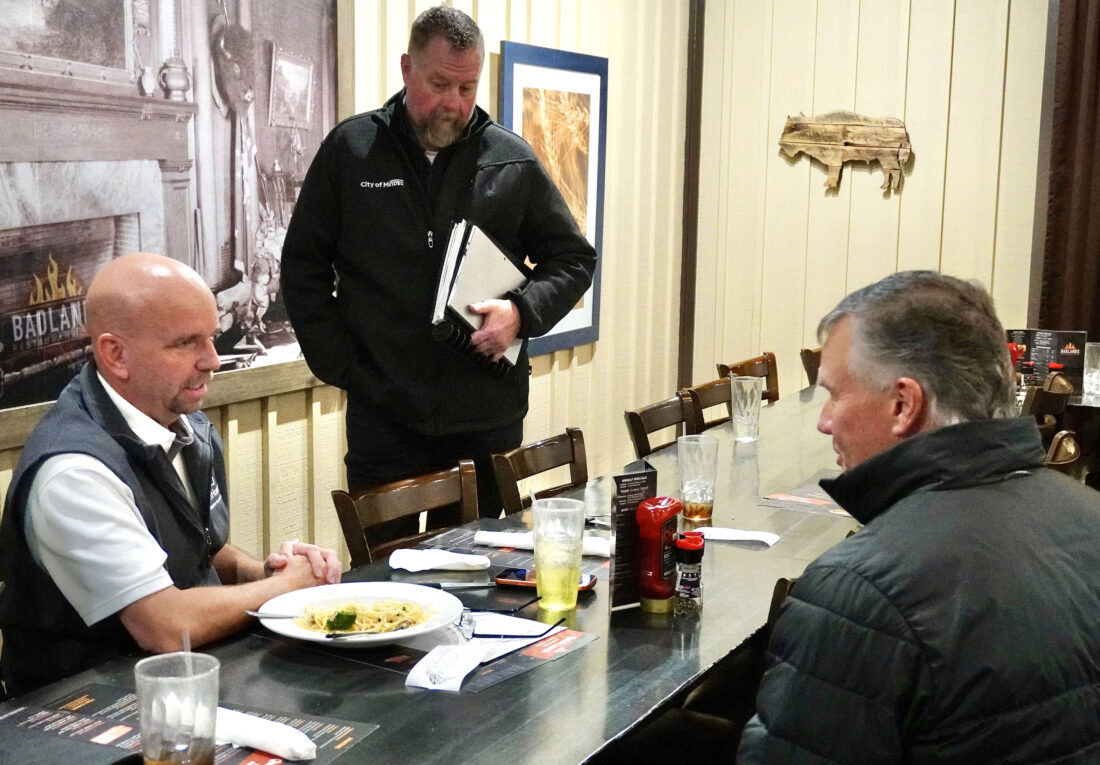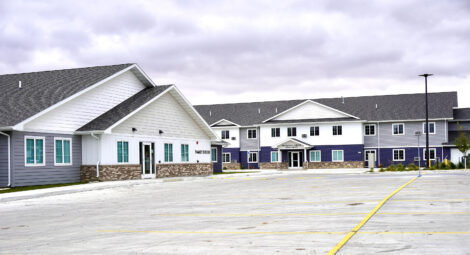Local tax entities see levy cap issues

Jill Schramm/MDN State Rep. Scott Louser, Minot School Board member, left, speaks with Ward County Commissioner Ron Merritt, right, and Minot Finance Director David Lakefield, center, at the conclusion of a government liaison committee meeting at Badlands Bar & Grill in Minot Thursday, Oct. 30.
Some property owners expecting to see their December tax bills held to an increase of 3% or less could be disappointed, according to Minot and Ward County tax officials.
Members of the Minot Liaison Committee, consisting of city, county, school and park officials, discussed the complexities of the new state law limiting property tax increases at a meeting Thursday, Oct. 30.
Ward County Auditor Marisa Haman said county officials from across the state, meeting this past week, noted the 3% cap on the dollars levied doesn’t consider possible changes in individual property valuations or other factors in the new law, such as which of the past three years the 3% is calculated against. Consequently, there’s a misconception that bills can go up only 3%, Haman said.
“That’s kind of the general consensus now, and I know that’s not the case,” she said.
Ward County Commissioner Miranda Schuler said the Association of Counties this past week passed a resolution to eliminate the property tax cap after removing language that included the option of modifying the cap.
“It’s slightly troubling, because it puts us on a path for potentially another Measure 4,” she said of the property tax elimination ballot measure that failed in 2024. “I think modification is probably the key to making this work.”
State Rep. Scott Louser, a Minot School Board member, said the state’s rationale for the cap was to prevent taxes from eating up a $1,600 primary residence property tax credit.
“If we continue with the credits, I don’t see the caps going away,” he said. However, he said the views of local governments will weigh more heavily in the next session.
“I think the Association of Counties, the League of Cities, the School Board Association – all of those groups are going to have a louder voice this next session, to say, this is what happened in Minot. This is what happened in Ward County. And we’re doing all of that in a likely revenue forecast that’s decreasing. So, it is going to be a tough session,” he said. “I think we’re going to modify the caps. They’re going to stay in place, but they’re going to be modified and they’re going to be modified based on, probably, budget size, community size and experience of what’s happened.”
Minot and Ward County officials talked about what they experienced in drafting budgets for 2026.
Minot Finance Director David Lakefield said the city’s budgeting process was helped by lower fuel costs and an easy winter with snow removal last year.
“We had some things going our direction and we’re looking pretty good right now, but that can change in an instant,” he said. “We’re one good snowstorm away from blowing up our budget.”
Schuler said some counties in the state have dipped into reserves to cover their costs rather than using the 3%, allowing that 3% to be carried forward and potentially compounded to impact residents in the future.
Lakefield added the City of Minot still has the ability to use the higher tax year of 2024 to calculate its 3% while using the 3% it is carrying forward.
“But now you end up with this roller coaster levy rate,” he said.
Minot City Manager Tom Joyce said the city can’t keep funding budgets with one-third of local revenue coming from reserves.
“That’s what it was this year – a third of our budget,” he said. “That’s not sustainable in the long haul.”
“There’s certainly pressure on the Legislature to put the pressure on us to cut the property tax,” Minot City Council member Lisa Olson said. “But I don’t think that people have the opportunity to see what impact the cuts have. That’ll be coming in this next year, year and a half, where there are things that they’re used to seeing that are no longer there.”
Anecdotally, Joyce recounted a conversation with a resident concerned about property taxes but also about street pavement markings that need repainting. Joyce explained funds need to be prioritized and not everything can be accomplished right away.
Officials also spoke about measures taken to try to rein in the rising cost of health insurance. Laura Dokken, business manager for Minot Public Schools, said a proposed insurance rate increase of 25% prompted a switch to a different health plan broker and new strategies that helped bring the cost down considerably. The school district is the only local taxing entity using its full 3% tax increase authority.



